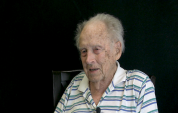2:39 | Anti-submarine warfare officer Frank Stovall describes the sonar room aboard the USS Reeves, a brand new destroyer escort. He was preparing for Atlantic duty and had been thoroughly trained in submarine hunting.
Keywords : Frank Stovall anti-submarine warfare (ASW) USS Reeves (DE-156) sonar whale C. Wallace Wally Martin

When Frank Stovall was growing up in Atlanta, he didn't let the Depression stand in his way. As a child, he sold eggs. As a teenager, he delivered groceries. When the enterprising young man got to Georgia Tech, he went for Navy ROTC.
A week before the attack on Pearl Harbor, Frank Stovall was told in his Navy ROTC class that the Navy was on alert for a Japanese attack. A week later, he was mystified that the attack was not anticipated. After graduation, he became an anti-submarine warfare officer and was assigned to a destroyer escort.
The first assignment for the USS Reeves was escort duty on a huge convoy to North Africa. Frank Stovall recalls that there were no problems with submarines on that trip, but the rough seas made almost everyone seasick. He was surprised at the relative modernity of Casablanca.
Frank Stovall befriended an English telephone operator while docked in Londonderry. After his ship returned stateside, he got her some gifts, but when he went to see her on his next visit, he got a big surprise.
While serving on the destroyer escort USS Reeves, Frank Stoval recalls five contacts with German submarines. Twice they succeeded in sinking American ships. As anti-submarine warfare officer, it was his job to find them.
When his ship was drydocked in preparation for going to the Pacific theater, Frank Stovall left the crew to go to radar school. This was fine with him because he was now married. He was in Washington DC working as a field engineer when Japan surrendered. His last job in the Navy was testing acoustic torpedoes.
After his service in the Navy, Frank Stovall went to work for Lockheed. His engineering expertise led to some manufacturing improvements and he was granted a patent for one of them.
Not all his memories of the war were negative. Frank Stovall laughs when he recalls the time he convinced the cooks to serve turnip greens. Another good memory was the time his crew held an event at the Waldorf Astoria.